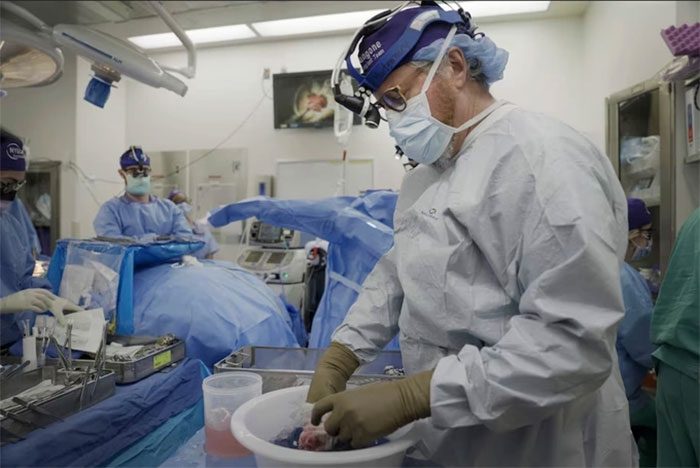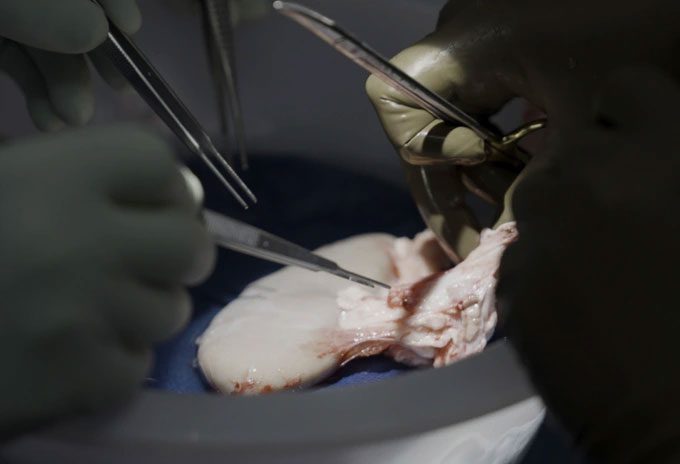The success of groundbreaking surgical procedures is a hope for millions of patients waiting for organ donations and transplants around the world.
On August 16, doctors at NYU Langone Health announced the successful transplantation of a kidney from a genetically modified pig into a brain-dead patient.

Robert Montgomery, director of NYU Langone Health, prepares the pig kidney for transplant into a brain-dead man on July 14. (Photo: AP).
According to the Washington Post, the transplanted kidney continued to function for 32 days, showing no signs of rejection. “As of now, it is still performing kidney functions such as producing urine and filtering out toxins…”, the doctors stated at a press conference.
In this transplant, the pig was bred under a special protocol to obtain a kidney that required only one genetic modification. This process aimed to eliminate a protein that the human immune system would immediately reject following the surgery.
Doctors plan to monitor the patient for an additional month to ensure that rejection does not occur.
Not long ago, in January 2022, surgeons at the University of Maryland transplanted a genetically modified pig heart into a seriously ill man. However, this individual died two months later due to a viral infection detected in the heart.
Learning from this case, the surgeons at NYU Langone reported that they employed a more complex testing protocol, hoping to screen for such viruses before transplantation.
They also transplanted the thymus from the pig into the patient’s body to help train the immune system to accept the kidney from a different species.

The genetically modified pig kidney was transplanted into a brain-dead man in New York on July 14. (Photo: AP).
On the same day, August 16, a study from the Heersink School of Medicine at the University of Alabama at Birmingham reported similarly promising results regarding a brain-dead patient who received two pig kidneys earlier this year.
The results published in the JAMA Surgery journal indicated that the kidneys from the pig, which underwent 10 genetic modifications, continued to perform essential functions such as filtering toxins and accumulating urine after being transplanted into the human body.
Jayme E. Locke, the lead author of the study, stated: “This is the first time in history that anyone could receive genetically modified pig kidneys to maintain function and sustain life.”
The success of these two groundbreaking surgeries is a beacon of hope for millions of patients awaiting organ donations and transplants worldwide. This research also opens up the potential for creating other replacement organs from pigs, such as hearts, lungs, and livers, for human transplantation.
Why transplant pig kidneys for brain-dead patients?
For decades, scientists have worked diligently to enable organs from genetically modified animals to function in the human body without being rejected.
This is due to the extremely limited supply of viable organs such as hearts, kidneys, and livers from living healthy individuals and those who have passed away.
However, when it comes to transplanting body parts that do not “belong” to humans, such as hearts, kidneys, or stomachs, another challenge arises. The rejection process is an inevitable consequence.
Just hours after transplantation, even with the administration of immunosuppressive drugs, a phenomenon known as the “hyperacute rejection system” occurs, leading to transplant failure and patient death.
This outcome has left even well-funded research projects with significant technological advancements in modern medicine unable to be applied as a viable method to sustain life and organ function.
As a result, scientists can only hope for trials on brain-dead patients or voluntary organ donation, serving as “test cases” before they become a recognized and feasible medical therapy.


















































